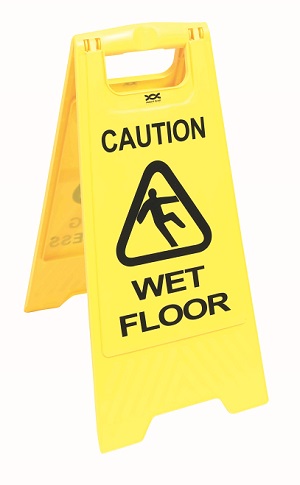Slips trips and falls
Slips, trips and falls are one of the most common cause of accidents in the workplace and every year around 10,000 people in the UK suffer a major slip or trip injury at work with an average 90% resulting in a broken bone. Sometimes people can take the attitude that slips and trips just happen and you can't do anything about them, however certain factors can be considered to avoid injury and preventative actions recommended.
Five slip potential factors
1. CONTAMINATION
Keep floors and surfaces clear of product and product waste and if you discover a
spillage:
- Guard or isolate the area, warning everyone of the hazard.
- Call for another colleague and arrange for the spillage to be cleared up immediately.
- Clean up any spillage and dispose of the waste correctly.
- If it is a spillage of a controlled drug such as methadone this must be reported to the pharmacist and then recorded in the CD register to be reported accordingly. Make a best estimate of the amount spilled if the exact amount is unknown with the help of a colleague.
- Never leave a spill site unattended or unguarded. People may not only slip, but could potentially be exposed to a dangerous substance.
2. CLEANING

- If a floor area is being cleaned and is therefore wet, ensure other employees are aware and that a caution 'wet floor' sign has been sited appropriately.
- If there is a wet floor in a public area apply the same principles. It may be that it has been raining outside and the floor around the pharmacy door has become particularly wet. Should you have any concerns that a customer may not see a caution sign (for example a customer with a visual impairment) then monitor the area until the floor has dried.
3. HUMAN FACTORS
- DO NOT take shortcuts or run within the pharmacy.
- It is important to communicate any potential hazards to colleagues or customers, ensuring they understand any safety instructions.
- When given instructions to follow it is your responsibility to do so.
- Fatigue can play a role, if someone is tired they are more likely to experience a slip, trip or fall, so be aware of this as a risk factor.
4. ENVIRONMENT
- Keep all doorways, stairs and access routes clear of boxes, bags and other materials.
- Close cupboards and drawers after use.
- Keep floors clean and place rubbish in the bin.
- Take care when ascending and descending stairways, hold onto handrails.
- Have an awareness of what you are placing on the floor.
- Take care with steps, ladders or kick stools.
5. FOOTWEAR
- Some footwear can increase the chance of a slip or trip happening.
- At work it is advisable to wear footwear that fits well, avoiding open-toed shoes, sandals, flip flops, high heels and smooth soles.
- Remember that 'sensible' footwear is not necessarily 'slip resistant' footwear and therefore it is important to consider the type of floor at work and if footwear has sufficient grip.
